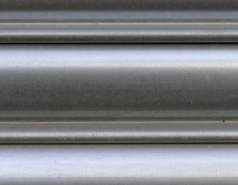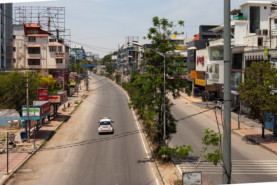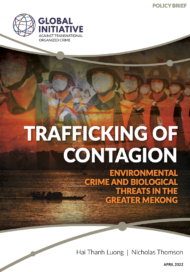Posted on 03 Jun 2020
To dive deeper into the emerging relationship between corruption and the COVID-19 crisis response, the Global Initiative spoke with Heather Marquette, professor of development politics at the University of Birmingham.
Under the threat of COVID-19, economies have constricted worldwide. At the same time, government budgets have expanded to help healthcare systems respond to the pandemic, assist social-welfare programmes in addressing growing unemployment, and enable supply chains to replenish basic goods. With resources dwindling, the need to prevent public and private corruption has taken on a renewed urgency.
Dr Marquette studies the nexus between corruption, crime and conflict in international development – what she calls the ‘three Cs of the dark side of development politics’ – and shared critical, data-driven insight and policy recommendations.
What are your observations and concerns about the risks of increased corruption worldwide amid the pandemic?
Three main issues jump out at me. The first is the combination of the breadth and complexity of the crisis, and the need for a rapid response. COVID-19 is so all-encompassing that even governments with the highest capacity are struggling to respond at pace in all areas. Bad decisions are being made, corners are being cut and regulations are being loosened. Large contracts are being given out without competitive tenders or normal due-diligence checks. All of these create opportunities for corruption to thrive.
There’s a classic corruption equation from Robert Klitgaard: ‘corruption = monopoly + discretion – accountability’. On 14 April, the World Food Programme announced the launch of an air hub for COVID-19 response in Addis Ababa’s Bole International Airport, in partnership with the Ethiopian government. While this may make sense from a humanitarian-coordination perspective, it creates a monopoly-supplier overnight. No matter where in the world this was, I would hope to see robust mechanisms in place to ensure oversight in every part of such a huge and complex supply chain and administrative process.
Ventilators and other medical supplies, for example, are highly valuable in an urgent, resource-scarce environment, and they are highly portable, making them susceptible to corruption and organized crime. We have already seen shipments captured by organized-crime gangs and sold to – or sometimes stolen to order by – wealthy elites. It takes a lot to ensure that medical equipment and supplies make it through customs, that trucks carrying supplies from the airport do not get hijacked, that they get to the right hospitals, that they are used on the right patients, and that no one has to pay a bribe for treatment. In all this, an awful lot of urgent oversight and security are needed.
The second issue is that of opportunism. Crises create opportunities, and the bigger the crisis, the more ambitious and plentiful the opportunists. Wired recently wrote about ‘COVID-19 carpetbaggers’ or ‘ideas opportunists’ pitching information, and misinformation, on COVID-19. The guaranteed market for COVID-19 medical supplies makes an excellent business opportunity for organized-crime groups looking to expand into new markets, and we are already seeing problems like counterfeit and substandard goods, illicit online sales of medicine and medical supplies, fraud linked to legitimate trade in medicines and so on.
Shoddily built hospitals, defective personal protective equipment or ventilators, mis‑invoicing, cyber fraud, online drug sales – the list could be endless. We urgently need short-, mid- and long-term analysis on the ways that opportunists are likely to exploit this crisis – including building organized-crime and corruption intelligence and analysis into our health interventions.
The third issue is what I refer to as ‘corruption functionality’. Our research has shown that some corruption persists, in resource-scarce environments in particular, because it fills important functions. One example of this in pre-COVID life was healthcare bribery. The health workers demanding a bribe may be poorly paid, and have no option but to ask for or accept bribes to top up their salaries enough to afford basic needs like food, water and housing. Meanwhile, a patient seeking treatment when there are not enough doctors, nurses, beds, machines or medicine may offer a bribe, or pay one if asked, to access essential treatment.
With governments passing large economic-stimulus and public-assistance packages, and increasing the authority given to police and security forces, what tools remain available to the public to hold corrupt government officials accountable?
Some forms of face-to-face corruption may diminish owing to social and physical distancing – but this can hardly be called a silver lining of the current crisis.
Corruption that is hidden from the public in ordinary times is likely to continue, and may even thrive. Holding power-holders to account will be vital, but how possible will it be – including when opposition politicians, the media and oversight bodies may face pressure to refrain from questioning the actions of leaders and governments to avoid being criticized for ‘politicizing’ COVID-19?
Being able to speak up publicly on corruption – COVID-19-related or not – is more vital now than ever. There need to be visibleguarantees of resourcing for law-enforcement agencies, oversight bodies, anti-corruption agencies and whistle-blowers to make it clear that the system is still working. Some countries are establishing dedicated oversight bodies – for example, the new Coronavirus Disease Response Transparency Task Force in Sierra Leone. The role of citizen journalism is vital, especially as traditional media outlets struggle financially or face political pressure, as is the role of academics, think tanks and organizations like the Global Initiative.
Our pre-COVID world also provided plenty of bread crumbs that we can follow to see where opportunists may take advantage of economic-stimulus packages and public financial assistance programmes. As a friend said: ‘It’s a shame that the coronavirus doesn’t spread through public tenders. We’d know exactly who’ll get it.’
Ordinary people often know which companies and individuals don’t play by the rules; journalists and activists will certainly know. Existing research – such as the study of ‘red flags’ in public procurement funded by the UK’s Department for International Development – provides evidence of corrupt practices and methods to flag potential corruption.
People trying new forms of corruption or criminality will also make mistakes, like all newcomers. This will create opportunities for watchdogs, if they are alert – especially for civil society, who may be best placed to galvanize public anger at people seen to profit from the pandemic.
Although not all companies that are registered in tax havens, or are anonymous, are corrupt or criminal, secrecy does mask a wide range of illicit activities. The move by the governments of Denmark and Poland to block firms that are registered in tax havens from receiving state bailouts couldhave an anti-corruption effect as well, particularly if they were also to block the same firms from public-procurement opportunities.
By rewarding firms that behaved responsibly before COVID-19, governments could nudge more legitimate firms out of the darkness and into the light, leaving tax havens and shell companies to the criminal and the corrupt, and blocking these from profiting opportunistically from the pain of the pandemic.
What additional forms of corruption do you believe are at the greatest risk of emerging?
In addition to my concerns about the potential rise of petty corruption, I’m also particularly concerned about reports of criminal gangs involved in the COVID-19 response. I’m with Tuesday Reitano and Mark Shaw on their recommendation not to partner with criminal groups. Criminal groups are not looking for legitimacy: their end game is profit. Engaging with politicians or seeking power is not the same as seeking legitimacy for its own sake. What they are looking for is reciprocity: we did you a favour, and there will be a price to pay. As reports show, many community members understand this well, and it is important for external actors to understand it too.
According to the ENACT Organised Crime Index Africa 2019, ‘in 40 of the 54 African states, … state-embedded criminal actors have a significant or severe influence on society and state structures.’ I’m not yet sure how COVID-19 may affect this, but it won’t be good.
What policy recommendations do you have for governments to reduce the risk of public corruption during the pandemic response?
The first is something I wrote about recently in a blog for Oxfam: the need to ‘(hold your noses) “not let a good crisis go to waste”’. In every crisis we are able to make better decisions and to ‘do things that you didn’t think you could do before’. COVID-19 offers an unprecedented opportunity to fix the systems that enable corruption and organized crime to thrive – if we are willing to change.
The second is to avoid translating urgent need into a reason for dropping governance standards. We need to find ways to do the right things more quickly, rather than not doing the right things because they take too long. Act quickly, but be open by default – transparency enables ex-post accountability, when there is again time to pursue it. Imagine that your decisions and your actions will be held to account and ask, did you balance urgency with integrity? Someday, there will almost certainly be a reckoning.
The interview with Dr Marquette has been lightly edited for length and clarity.



